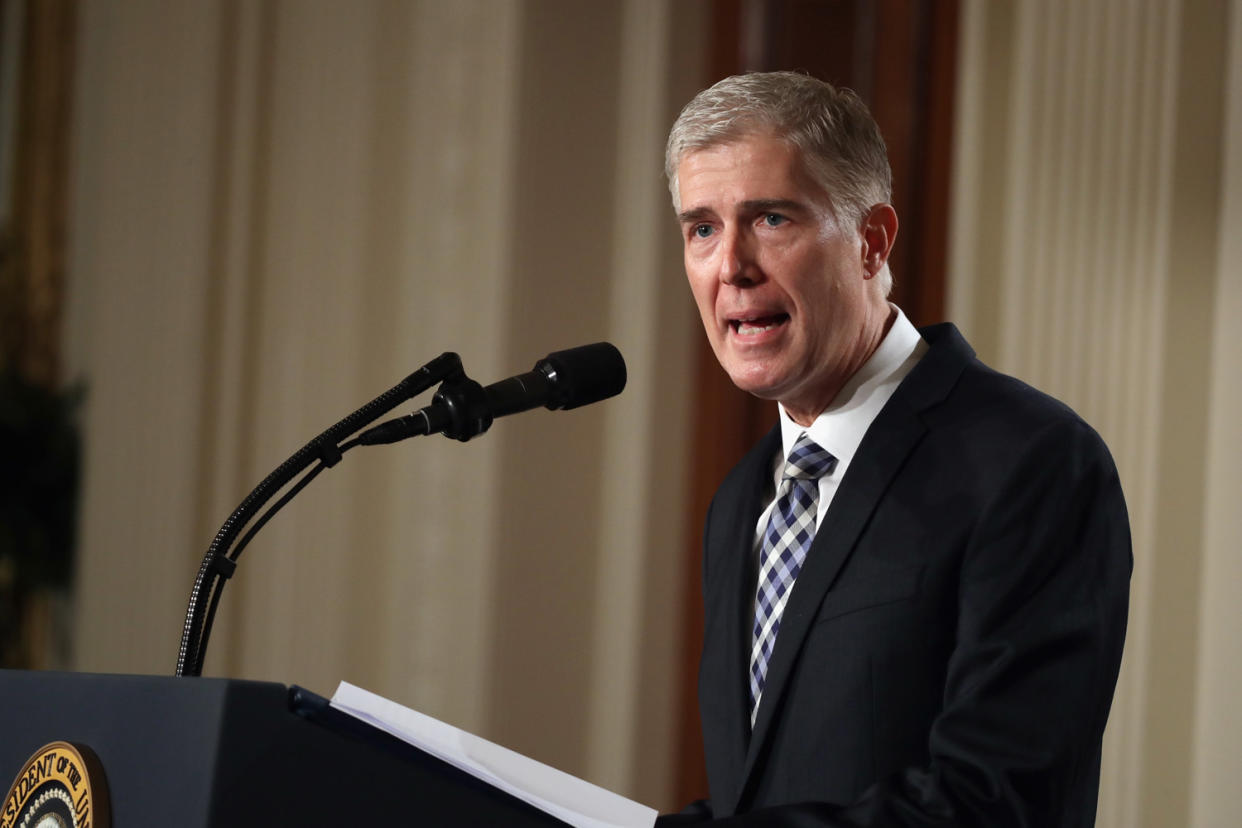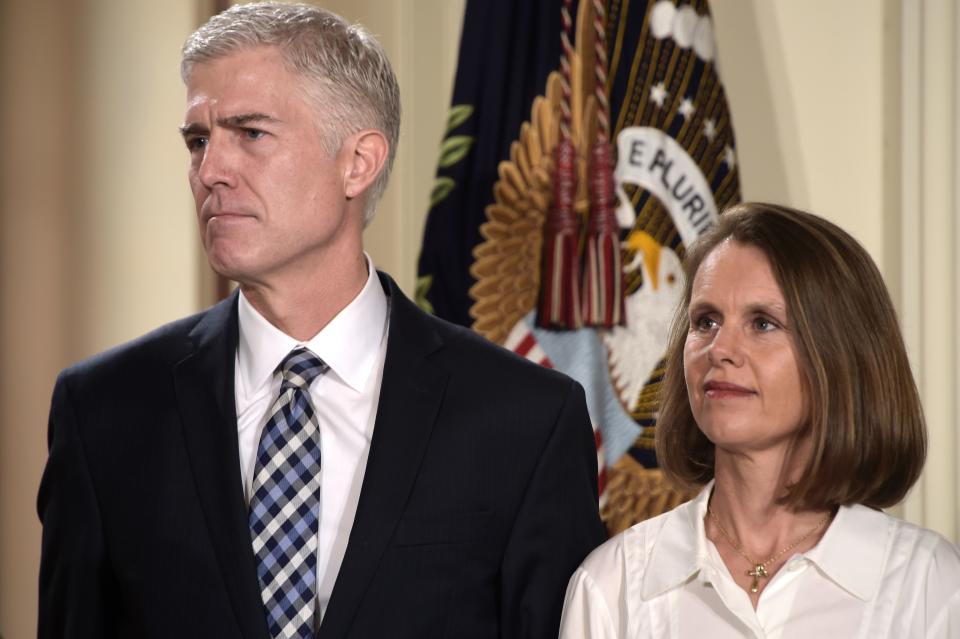12 Things to Know About Neil Gorsuch

President Donald Trump on Tuesday night announced his nominee for the Supreme Court, Neil Gorsuch, a justice on the 10th Circuit Court of Appeals in Denver, Colorado. The pick wasn't surprising, as Trump had included Gorsuch in his list of potential nominees during the campaign.
Hope you like my nomination of Judge Neil Gorsuch for the United States Supreme Court. He is a good and brilliant man, respected by all.
- Donald J. Trump (@realDonaldTrump) February 1, 2017
The process now moves to the Senate for confirmation.
Here's what you need to know about Gorsuch:
1. He has an impressive legal pedigree.
Gorsuch certainly has the résumé to back up his nomination. He's a graduate of Columbia, Harvard, and Oxford (and actually attended Harvard Law with Barack Obama). He clerked for two Supreme Court justices (Byron White and Anthony Kennedy). In 2006, he was appointed to the U.S. Court of Appeals for the 10th Circuit by then-President George W. Bush and reportedly "sailed through" his Senate confirmation.
2. He's one of the youngest Supreme Court nominees ever.
At 49, Gorsuch is one of the youngest Supreme Court nominees ever. If confirmed, he could sit on the bench for decades and shape the law for generations to come.
3. He greatly admired Antonin Scalia.
If confirmed, Gorsuch will fill the vacancy left by Antonin Scalia, who died in 2016. That is fitting considering Gorsuch's admiration for the late justice.
In a speech last year at Case Western Reserve University School of Law in Cleveland, he said, “The great project of Justice Scalia’s career was to remind us of the differences between judges and legislators."
Justice Scalia and Judge Gorsuch
photo obtained by @Arianedevogue pic.twitter.com/Tw1ydGczhq- Jake Tapper (@jaketapper) January 31, 2017
4. He's a textualist.
When it comes to interpreting the law, Gorsuch is a textualist, meaning he considers only the actual words of the law in question - not the intent of the legislators or the consequences of the decision at hand. And, like Scalia, he also practices originalism when it comes to interpreting the Constitution, which means he interprets the words as they would have been used when the document was written.
"Judges should instead strive, if humanly and so imperfectly, to apply the law as it is, focusing backward, not forward, and looking to text, structure, and history to decide what a reasonable reader at the time of the events in question would have understood the law to be," Gorsuch said in his Case Western Reserve University speech.
5. He sided with Hobby Lobby in religious challenges to the Affordable Care Act.

Gorsuch sided with Little Sisters of the Poor and the owners of Hobby Lobby in their claim that the provision of the Affordable Care Act that required employers to pay for contraceptive coverage infringed on their religious freedoms. The famous case eventually went to the Supreme Court, where the court ruled that family-owned and closely-held companies could opt out of that provision if they had religious objections to it.
6. He wrote a book about assisted suicide - and he's not for it.
In 2006, Gorsuch published a book titled The Future of Assisted Suicide and Euthanasia. While he gave a fair look at both sides of the argument, Gorsuch ultimately came down in opposition of assisted suicide, writing, “all human beings are intrinsically valuable and the intentional taking of human life by private persons is always wrong.”
7. He's considered a danger to women's rights.
Although Gorsuch has never ruled directly on abortion rights, his rulings on contraception coverage and his desire to rehear - and likely overturn - a court's decision to block Utah's attempt at defunding Planned Parenthood lead most to believe he would lean toward pro-life rulings in matters of reproductive health.
The National Institute for Reproductive Health said Gorsuch is "an extension of the Trump administration’s attacks on women’s rights."
"Gorsuch's prior ruling in favor of Hobby Lobby in its effort to deny its employees coverage for contraception, and his decision to side with Utah Gov. Gary Herbert's effort to defund Planned Parenthood, suggest he would strike at the core of [Roe v. Wade]," Andrea Miller, president of the National Institute for Reproductive Health, said in a statement.
Karen Middleton, executive director of NARAL Pro-Choice Colorado, said Gorsuch "has a record of ruling in a way that does not reflect Colorado values on reproductive rights."
And Sen. Bernie Sanders tweeted that Gorsuch "must explain his hostility to women's rights."
Judge Gorsuch must explain his hostility to women's rights, support of corporations over workers and opposition to campaign finance reform.
- Bernie Sanders (@SenSanders) February 1, 2017
8. He's concerned with overcriminalization.
When ruling on criminal cases, Gorsuch has a record of often siding with defendants to avoid overcriminalization. In one recent case, he wrote a dissent siding with a middle schooler in Albuquerque who was strip-searched by his school, even though the majority opinion held that the officials involved were immune from lawsuits. In another notable case, Vox notes, Gorsuch "argued against applying the federal law banning felons from owning firearms to a defendant who had no idea he was a felon."
In 2013, Gorsuch delivered the Barbara K. Olson Memorial Lecture at the Federalist Society’s National Lawyers Convention in Washington, D.C., and argued against overcriminalization.
"Without written laws, we lack fair notice of the rules we as citizens have to obey," he said. "But with too many written laws, don’t we invite a new kind of fair notice problem? And what happens to individual freedom and equality when the criminal law comes to cover so many facets of daily life that prosecutors can almost choose their targets with impunity?"
9. He has supported term limits for elected officials.
Gorsuch has argued in favor of term limits for lawmakers, which might not endear him to the members of Congress who will vote on his Supreme Court nomination.
“Recognizing that men are not angels, the Framers of the Constitution put in place a number of institutional checks designed to prevent abuse of the enormous powers they had vested in the legislative branch,” he co-wrote in a 1992 paper for the Cato Institute. “A term limit, we suggest, is simply an analogous procedure designed to advance much the same substantive end.”
10. He sort of founded a "Fascism Forever" club in prep school.
While attending the elite Jesuit all-boys high school Georgetown Preparatory, Gorsuch apparently founded and served as president for a student group called the "Fascism Forever Club." According to the school's yearbooks, first uncovered by the Daily Mail, Gorsuch founded the club as a freshman and served as its president until he graduated. The goal of the club was to allegedly fight back against the school's "left-wing" faculty members.
"In political circles, our tireless President Gorsuch’s 'Fascism Forever Club' happily jerked its knees against the increasingly 'left-wing' tendencies of the faculty," one yearbook entry reads.
But this might just have been all a joke. Snopes looked into the report, and Georgetown Preparatory said "no such club ever existed." Steve Ochs, a teacher there who was Gorsuch's student government adviser, told America magazine that it was "a total joke," meant to reference people who criticized his conservative beliefs. “There was no club at a Jesuit school about young fascists,” Ochs told the Catholic magazine. “The students would create fictitious clubs; they would have fictitious activities. They were all inside jokes on their senior pages.”
As a few sources have pointed out, it appears Gorsuch continued to make similar political comments throughout college, as well.
Friend emails turns out Neil Gorsuch was in her class at Columbia, here are yearbook photos pic.twitter.com/H7VPHMNT61
- Laura Rozen (@lrozen) February 1, 2017
Next to his yearbook picture from Columbia University, Gorsuch chose to include the Henry Kissinger quote, "The illegal we do immediately, the unconstitutional takes a little longer."
11. He thinks Trump's tweets about judges and the judiciary system are "demoralizing."
The opinion of this so-called judge, which essentially takes law-enforcement away from our country, is ridiculous and will be overturned!
- Donald J. Trump (@realDonaldTrump) February 4, 2017
Despite being nominated to the Supreme Court by Trump, Gorsuch and the president definitely have their differences - and after the latter attacked a federal judge on Twitter for blocking his immigration ban, Gorsuch reportedly told Sen. Richard Blumenthal that he found the tweets to be "demoralizing" and "disheartening."
"He certainly expressed to me that he is disheartened by the demoralizing and abhorrent comments made by President Trump about the judiciary," Blumenthal told reporters Wednesday, according to People. "I believe he has an obligation to make his views known more explicit and unequivocally to the American people."
A representative for Gorsuch confirmed to CNN the judge has used both "demoralizing" and "disheartening" to describe Trump's distrust of the judiciary system as seen in his tweets.
12. He is married with two kids.

Gorsuch's wife, Marie Louise, was by his side when Trump announced him as nominee for the Supreme Court. Together they have two daughters: Emma and Belinda.
He's a fourth-generation Colorado native and comes from a family of prominent Republicans. His mother, the late Anne Gorsuch Burford, was director of the Environmental Protection Agency under the Reagan administration where, according to the Denver Post, "she slashed the agency’s budget and resigned under fire in 1983 during a scandal over mismanagement of a $1.6 billion program to clean up hazardous waste dumps."
You Might Also Like


